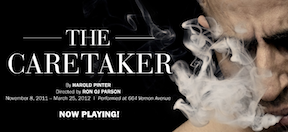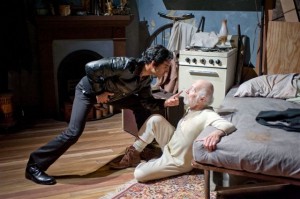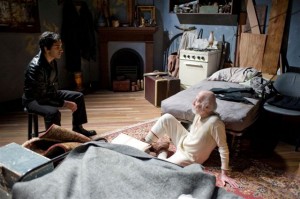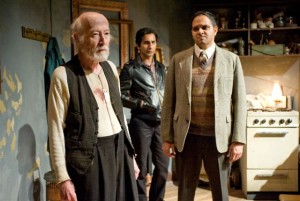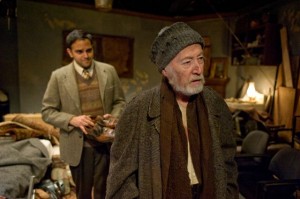TAKING CARE TO CREATE EXCELLENT THEATER
The plot of Harold Pinters’ The Caretaker is uncomplicated on the surface and densely complex in its subtexts; it is a melding of realism and theatre-of-the-absurd which places a thuggish and volatile young man, his brain-damaged older brother, and a scruffy old tramp together in a rubbish-strewn room. From these seemingly unpromising characters, Pinter constructed a classic of modern drama which is open to interpretation – psychological, philosophical, religious, or political – depending on one’s point of view. There may be debate over Pinter’s intentions, but on one point there must be unanimous agreement: The Caretaker at Writers’ Theatre is a dazzling viewing experience that doesn’t relax its grip on an audience from opening moment to final blackout.
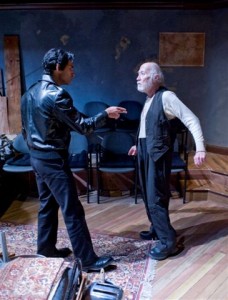 An irascible and grungy derelict named Davies is brought by Aston into his east London house, specifically into that debris-filled room. Brain-damaged Aston has survived cruel electric shock therapy (intended to treat hallucinations) and now carries the mental aftereffects in his vague and distant manner. Also in the flat is Aston’s younger brother Mick, an erratic, menacing figure subject to extravagant mood swings.
An irascible and grungy derelict named Davies is brought by Aston into his east London house, specifically into that debris-filled room. Brain-damaged Aston has survived cruel electric shock therapy (intended to treat hallucinations) and now carries the mental aftereffects in his vague and distant manner. Also in the flat is Aston’s younger brother Mick, an erratic, menacing figure subject to extravagant mood swings.
The tramp, an outsider his entire life, sees an opportunity to establish a home for himself, especially after one brother offers him the job of caretaker for the house. The crux of the plot is Davies’ attempt to create alliances separately with Aston and Mick against the remaining brother (the brothers are rarely on stage at the same time throughout the play). However, Davies’s power ploys only lead to his alienation from both Mick and Aston – he has overplayed his hand and both men turn him away. Davies’ expression of desolation and despair and pleading in the final moment of the play is unforgettable.
The Caretaker displays the main ingredients of what has come to be known in modern drama as “Pinterian.” There is the indefinable sense of menace that lurks beneath the most matter-of-fact language – comedy quickly dissipates into the sinister – and his famous pauses enhance the intensity or ambiguity of the moment.
In an extended and stumbling monologue – one of Pinter’s mesmerizing verbal arias – Aston speaks about his past, including his horrifying experience in the hospital. It is a riveting speech that had the audience holding its breath, even as the playwright tells us almost nothing about the brothers – how they make their living, where they come from, or even who really owns the house.
The Writers’ Theatre production features William Norris as Davies in a career-defining performance. Davies is a rich brew of wheedling, whining, fear, desperation, and clumsy cunning; he handles the bulk of the play’s dialogue and rarely leaves the stage. Norris shifts emotional gears beautifully as he tries to insinuate himself with both Mick and Aston while hiding behind a façade of bravado.
There is unconventional casting in employing a pair of south Asian actors for roles of the brothers, Kareem Bandealy as Mick and Anish Jethmalani as Aston. The ethnic casting is a little distracting early in the play when the brothers impassively listen to the bigoted Davies rail over and over against “blacks” (meaning Indians); since there is no attempt to skew the play along racial lines, Bandealy and Jethmalani likely were hired as simply the two best actors for the parts.
Mick is the more incendiary of the brothers and Bandealy is terrific at skittering in a flash from casual to confrontational, unpredictable, and scary. Jethmalani is the perfect counterbalance as the soft-spoken Aston, carrying a congenial, sometimes perplexed attitude throughout the play until he stuns Davies with his rejection at the end – a moment when the tightly-wound Aston turns (potentially) just as explosive as his mercurial brother.
Along with the shifting power struggles, the play explores the need for each character to sustain illusions as a survival mechanism: Davies constantly refers to Sidcup, where he must travel to retrieve “his papers” that will enable him to sort out his life – it’s a trip he will never make, but the idea endows him with the shred of hope he needs to get through his dreary days; Ashton talks about building a shed outside the house; and Mick rambles on about his plans to redecorate the dwelling (among other grandiose projects), but that shed will never be built and those projects will never happen – their dreams are their action.
Ron O.J. Parson directs with the surest of hands, orchestrating the tonal swings for maximum dramatic effect and playing the pauses and silences to just the right length, his subtle embellishments enhance the text, allowing Pinter to speak for himself. The designers have joined together to create a fine visual and aural setting for the play: Jack Magaw’s junk-filled room, enclosed by the audience on all four sides, is virtually a fourth character in the play, aided by Nick Heggestad’s props; Janice Pytel’s costumes and Heather Gilbert’s lighting all serve the production well. Michael Griggs designed the sound and, presumably, selected the dramatically effective jazz excerpts between scenes.
photos by Michael Brosilow
The Caretaker
Writers Theatre in Glencoe
ends on March 25, 2012
for tickets, visit Writers
for more shows, visit Theatre in Chicago
